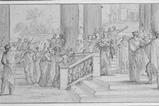Elaine Storkey unpacks Matthew 19, and reminds us that our relationships should be faithful, safe and loving
Study passage: Matthew 19:1-12
A woman went to her pastor for advice about her sister who had endured years in an abusive marriage. She had long been concerned about her sister’s low self-esteem, but since her brother-in-law’s violence had escalated, she now worried for her safety. The husband refused counselling, denying the issue, so she felt her sister should begin divorce proceedings before things got worse. The pastor listened thoughtfully. He asked if the husband had had affairs or been unfaithful. She didn’t think so, but that wasn’t the problem: the man’s cruelty was. The pastor was sympathetic but saw it differently. He pointed out that Jesus’ teaching in the Gospel of Matthew was that a wife shouldn’t divorce her husband except on grounds of adultery. As a Christian, her sister needed to obey Jesus even if she found life hard and heavy-going.
The woman asked me if I agreed. I was surprised by the pastor’s insensitivity and failure to see that her sister clearly needed protection from a dangerous husband. But I also felt that his response could have shown greater biblical awareness. Nowhere does the New Testament condone a husband’s abuse of his wife. Peter urges men to confer honour on their wives because they are comparatively weaker (1 Peter 3:7), and Jesus’ words in Matthew about divorce need to be understood in a similar context. I urged my friend to persuade her sister to report the violence to the police. I also mentioned Christian organisations like Restored (restored-uk.org/) and Press Red (pressred.org/) that have track records in helping women in domestic abuse situations. The woman agreed, but she was still anxious to know what Jesus thought. She asked if I would take her through the passage in Matthew. Over a comforting cappuccino, we looked at it together.
The context surrounding Jesus’ words
It is crucially important to understand the context of Matthew 19. Jesus was travelling through Judea and facing the hostility of Jewish leaders. They had begun to hate his exposure of their hypocrisy and tried to involve Jesus in controversy. If they could get him to say something divisive, they might turn the crowds against him. The issue of divorce seemed to be the way in, as Jewish laws of marriage and purity were strict. A man was to marry a virgin from good parentage; never a slave or a prostitute. He must never corrupt another man’s wife. Fornication or adultery was punishable by death. Divorce was frowned upon – in Malachi 2:16, God said: “I hate divorce” (a common saying was that the altar itself wept when a man divorced the wife of his youth).
Despite that, divorce was surprisingly easy. It was permitted by the Mosaic law, which specified that if a husband “found some indecency in her”, he may give his wife a bill of divorce and send her out of his house (Deuteronomy 24:1). Under later rabbinic law, divorce was even seen as compulsory in cases of adultery or childlessness; since marriage was for procreation, a woman should be divorced if she hadn’t produced a child ten years into the marriage. So at the time when the Pharisees were confronting Jesus, Jewish opinion was strongly divided on how to interpret divorce law. What defined “indecency” had become a burning issue.
Two rabbinic schools dominated the interpretation. The school of Shammai ruled that “indecency” meant sexual misconduct and applied where the wife had been involved in other sexual relations. If she had been unfaithful (before or after marriage) the wife could be divorced, but for no other reason. Whatever her faults and however much her husband disliked her, as long as she did not commit adultery she could not be put away.
The school of Hillel, however, interpreted “indecency” much more broadly. For them, it meant that a man could divorce his wife if she spoiled his dinner, went out with her hair loose or spoke to men in the streets. Divorce was also permitted if she spoke disrespectfully of his parents, or if the neighbours heard her shouting. One rabbi (Rabbi Akiba, 50-135 AD) later ruled that a man could divorce his wife simply if he found another woman whom he liked better!
The Pharisees put the question to Jesus, knowing that he couldn’t win. Whichever school he backed would produce opposition from those who supported the other. But Jesus recognised their motive and refused to answer on their terms. Instead, he took the issue of marriage back to Creation itself and the marital union. A man leaves his parents and marries a wife. A new, one-flesh identity is created from the two individuals who enter it (Matthew 19:4-6). Offering a choice of rabbinic traditions dodges the deeper underlying issue. In the true Creation meaning, what God has joined together cannot be separated. In God’s ideal plan, divorce as a principle is wrong.
Frustrated, the Pharisees found another angle of attack. They quoted the Mosaic law to Jesus. “Why then did Moses command that a man give his wife a certificate of divorce and send her away?” (v7). Their strategy was clear: if they could charge Jesus with saying that the Torah itself was wrong, it would be a very serious allegation. Yet Jesus corrected them immediately. Moses did not issue any such “command”. This was simply a concession, allowed only because of men’s hardness of heart. The law arose from human failure, not God’s Creation plan. From God’s perspective, a man who divorces a faithful wife and marries another “commits adultery” (vv8-9).
The patriarchal system
In this exchange between Jesus and the Pharisees, you will have noticed that all the talk about divorce was directed to men, not to women. There was crucial reason for that. In Jewish law, men were the ones who did the divorcing. This was a patriarchal society where a woman had few legal rights. Her identity was subsumed under that of a man: first her father and then her husband. A girl could be engaged in childhood to be married to a man she’d never seen. She could be divorced without her consent, and in circles that followed Hillel, for practically no reason. But once married she could never divorce her husband. However much she might have wanted to, she had no legal power herself to bring the marriage to an end.
What Jesus was doing in his response to the Pharisees was refusing to reinforce the patriarchal system. Instead, he addressed the vulnerability of women. He argued that Moses’ ‘bill of divorce’ recognised the hard-heartedness and self-interest of men. If fact, it gave protection to the wife. It meant, at least, that she was legally free of the marriage and could marry again. Without it, she was locked into a dead relationship with no future hope. But Jesus argued that such a law was only a concession to fallen human nature, and necessary in a broken world. He reaffirmed God’s Creation principle for marriage as a mutual lifelong commitment where the woman as well as the man flourishes in a loving relationship.
How do we apply Jesus’ words today?
The disciples themselves got the point very quickly and recognised Jesus was challenging their male entitlement. If this is the case for a man, they exclaimed, it would be better not to marry! (v10). Today, we also need to understand the requirements of marriage more clearly. Our culture has its own blind spots, often seeing relationships as ‘fulfilling the self’ rather than the biblical notion of mutual self-giving. Sharing a Christian view of marriage takes effort. Preparation sessions run by churches can help people question their motives for marrying and identify the pitfalls in relationships. They can help us recognise that the person we marry will not be our saviour, or solve all the problems that trouble us in life. They can probe how the union of two personalities enables each to complete the other and what adjustments and sacrifices might need to be made. In marriage, people need the ability to hear the needs of the other, to forgive when they have been wronged and ask for forgiveness for their own failings. Marriage is about making allowances and ensuring that each can flourish and serve God in a safe, faithful, loving and caring relationship.
Yet the problem remains that we live in a broken world where marriages fail and people need protection. My friend’s pastor failed to understand that in the culture Jesus lived in, the best safeguard for the vulnerable was not to allow men ease in divorcing their wives. Instead, he interpreted Jesus’ words as restricting a woman from divorcing, even when suffering violence and abuse. Without losing sight of God’s Creation perspective, laws that permit divorce are needed in the culture we live in. But we must advocate for laws that recognise the needs of the vulnerable and reflect Jesus’ compassion and care.

































No comments yet